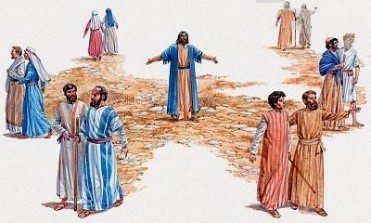
Is it 70 or 72? Bible translations differ on the actual number of disciples sent out by Christ. The NAB and Douay-Rheims states 72, while the RSV states 70. What’s important is not whether 72 or 70 is the exact number, but what it represents. In the Book of Numbers, Moses assembled 70 elders, as instructed by God, to share the burden of the Israelites (Numbers 11:16-17). It could be seen that Jesus chose the same number of disciples in order to fulfill the Old Testament; just as Moses had 70 elders, so did Jesus appoint 70 disciples to send out for a particular mission.
What is the significance of the mission of the Seventy (Luke 10:1-20) when Jesus had already sent out the Twelve on their mission (Matthew 10:5-15, Mark 6:7-13, Luke 9:1-6)?
To the Twelve, Jesus said: “Go nowhere among the gentiles, and enter no town of the Samaritans, but go rather to the lost sheep of the house of Israel.” (Matthew 10:5-6) On the other hand, Jesus sent the Seventy into every town and place where He Himself was about to come (Luke 10:1). The mission of the Seventy was clearly different from that of the Twelve with regards to whom they were sent to. The Twelve were instructed not to go among the Gentiles, but the Seventy were not restricted from going to the Gentile districts. The number 12 represents the number of the tribes of Israel, while the number 70 represents the number of nations in the world. Genesis 10 listed the various peoples known to the ancient Israelites and there were 70. Here, the insight could be made that Jesus initially sent the Twelve to the 12 tribes of Israel and that He sent the Seventy to all peoples, both Jew and Gentile. However, this was no longer the case later on because a number of the twelve Apostles went beyond the Jews to proclaim the Gospel.
Generally speaking, both the mission of the Twelve and of the Seventy were mostly the same: preach the Kingdom of God, heal the sick and cast out demons. (Matthew 10:7-8, Luke 10:8-9) The instructions were also similar: carry no purse, no bag, no sandals. (Matthew 10:9-10, Luke 10:4)
Although present-day missionaries do not follow these instructions word for word, the spirit of the instructions should always be kept; that is, when one has taken on the call of preaching the Gospel, attachment to material things must be avoided, and at a deeper level, one must trust in God’s providence rather than on one’s own clever devices. I think that that is the essence of this Gospel passage.
That continuing trust must be placed in God is reiterated upon the return of the Seventy; Jesus said to them, “I have given you authority to tread upon serpents and scorpions, and over all the power of the enemy… nevertheless, do not rejoice in this, that the spirits are subject to you; but rejoice that your names are written in heaven.” (Luke 10:19-20) Jesus reminded the Seventy not to lose sight of the fact that what they were able to accomplish was due to the authority which Jesus gave them. Therefore, the rejoicing should not be over what they have accomplished in this world, but rather that, if they persist as faithful disciples, they themselves will enter the Kingdom of which they were sent to proclaim. In Matthew 7, Jesus taught what a true disciple is: “Not everyone who says to me, ‘Lord, Lord,’ will enter the kingdom of heaven, but only the one who does the will of my Father in heaven. Many will say to me on that day, ‘Lord, Lord, did we not prophesy in your name? Did we not drive out demons in your name? Did we not do mighty deeds in your name?’ Then I will declare to them solemnly, ‘I never knew you. Depart from me, you evildoers.’” (Matthew 7:21-23) May we all learn the connection between doing the will of God and putting our trust in Him.